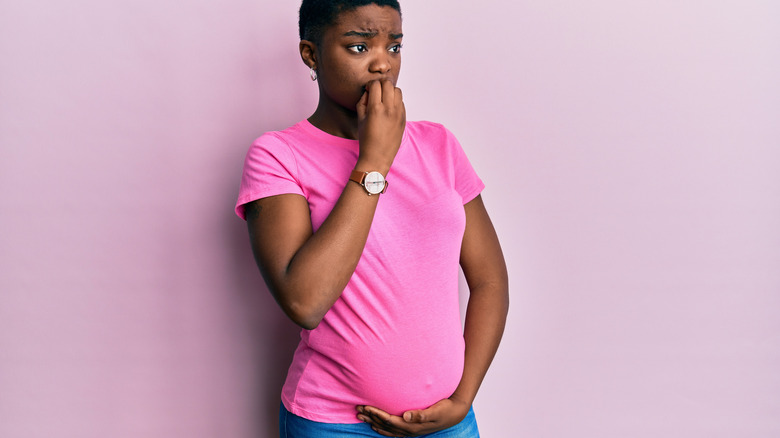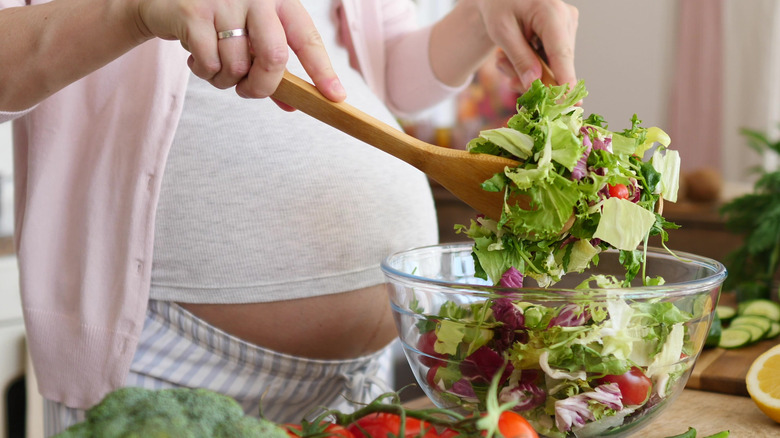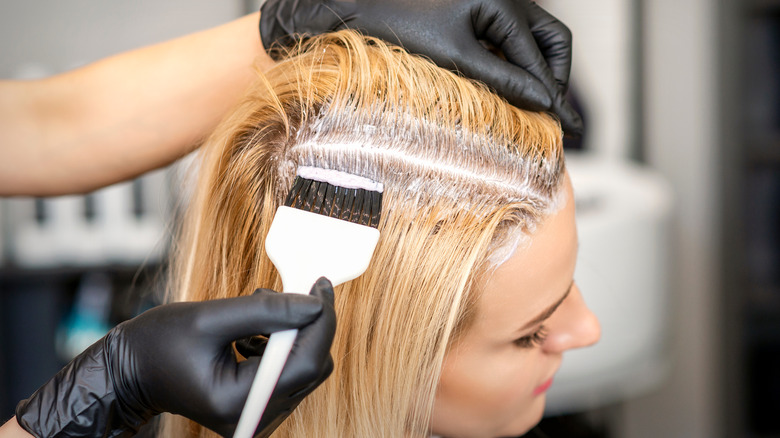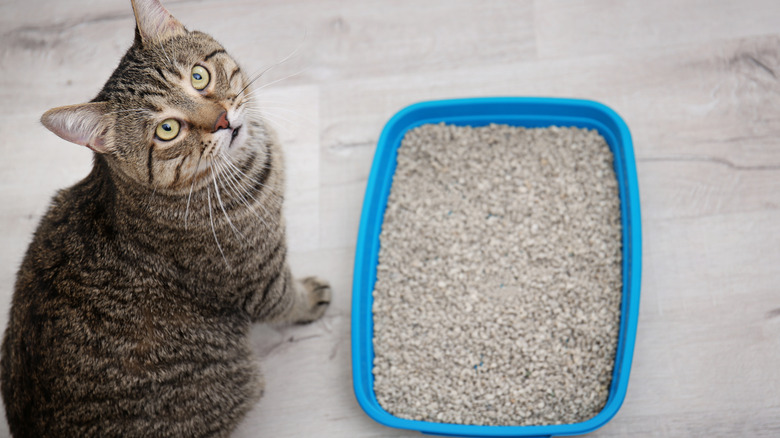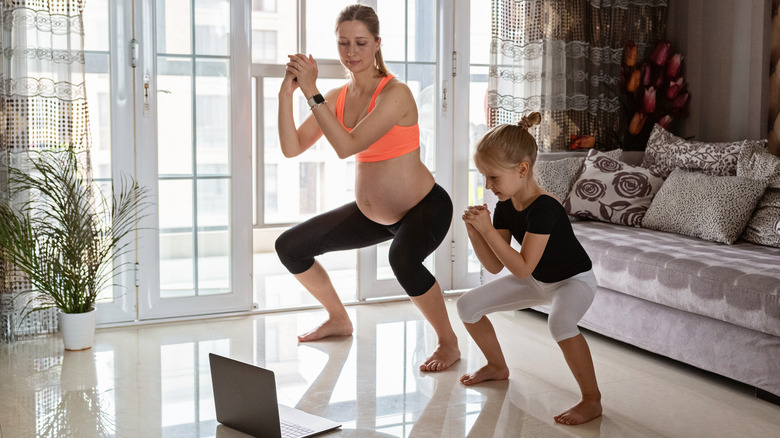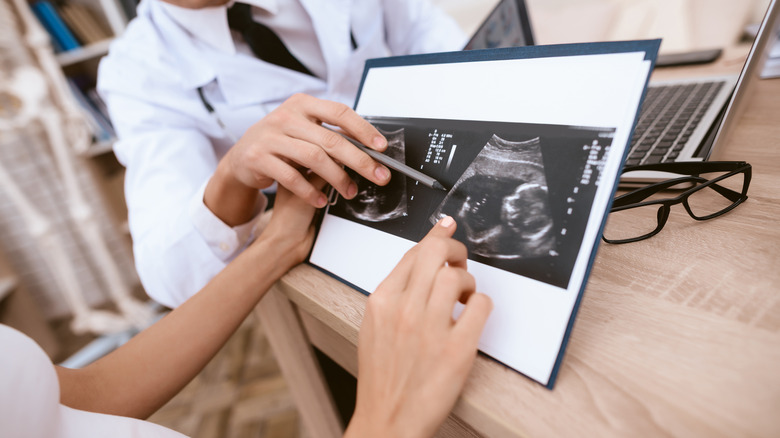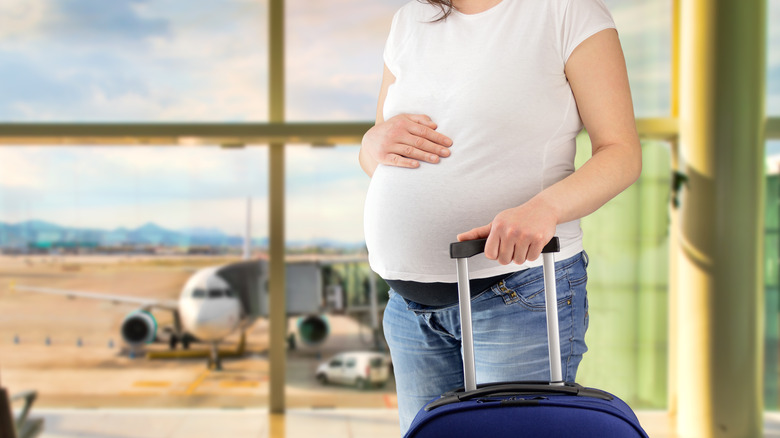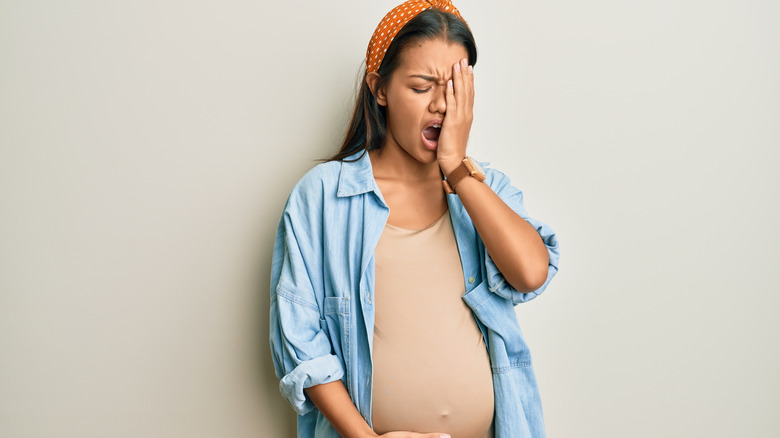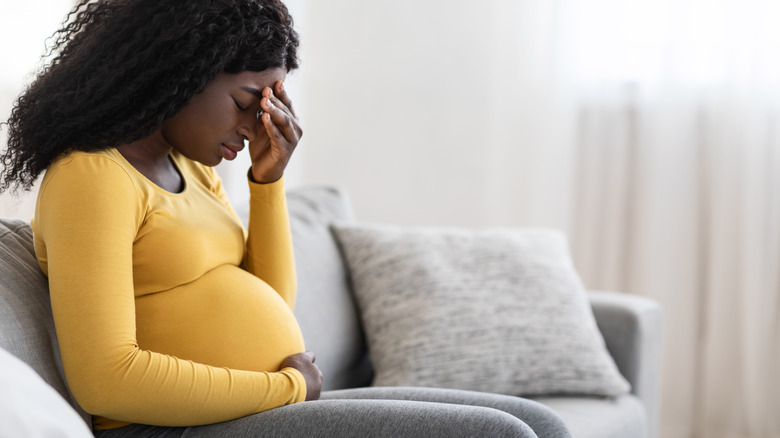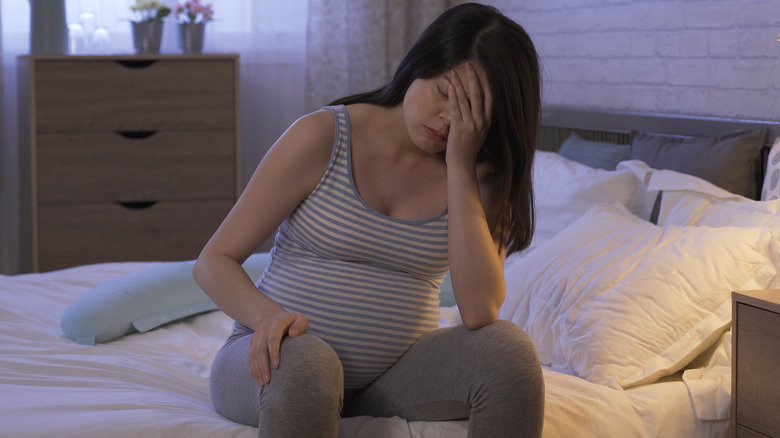Things You Should Never Do During Pregnancy
After the initial excitement (and perhaps panic) of finding out you're pregnant calms, you'll probably start combing the web or looking to friends and family for advice. Pregnancy comes with a ton of advice — some unsolicited — that may or may not be accurate.
Trying to remember what's best for you and the baby can sometimes get lost in the mix of morning sickness, buying baby gear, and picturing a future with your beautiful newborn in your arms. And if you have a lot of questions about your pregnancy, you're not alone. According to Statista, 29% of U.S. women wish they knew more about what to expect during each stage of pregnancy.
Pregnancy is a lot for a woman to handle, which is why it's crucial to set up an appointment with an OB-GYN as soon as possible. Your doctor will be your go-to person to ask questions and get medical-backed answers for anything that's on your mind. Most importantly, your doctor can calm your fears so that you can get back to taking care of yourself and your developing baby. In the meantime, it's a good idea to read up on the most important habits to avoid during pregnancy.
Never skip your prenatal vitamins
During your first prenatal appointment, you may end up with a prescription for prenatal vitamins or a suggestion for an over-the-counter supplement. These vitamins are different from ones you might take daily with breakfast. According to the American Pregnancy Association, prenatal vitamins contain necessary supplements for pregnant women, like iron and calcium, that your body needs more of as you grow a baby. Folic acid is another prime component of prenatal vitamins. The vitamin helps form the baby's neural tube and may be helpful in the prevention of some birth defects affecting the neurological system (via CDC).
Obstetrician-gynecologist Jill Purdie told Forbes, "Prenatal vitamins help fill the gaps [in a pregnant woman's diet], especially in the first trimester when pregnancy nausea and vomiting may prevent women from eating a variety of foods."
Your doctor may even encourage you to take prenatal vitamins before you get pregnant if you plan to become pregnant soon. That's because some vitamins in these supplements can prepare your body for a healthy pregnancy. Choline, in particular, can support a fetus' neurological development. Calcium is also a must-have nutrient before and during pregnancy, as it supports strong teeth and bone development (per Forbes).
Never abandon healthy eating just because 'you're eating for two'
You have another human being growing inside you that depends on your nutrients for its nourishment, but that doesn't mean you should be "eating for two" by doubling up your portions. Dietitian Jamie Dawn Tucker explained to UC Davis Health that overeating can lead to difficult-to-control weight gain during pregnancy. Although you should certainly gain some weight, gaining too much while pregnant can lead to conditions like preeclampsia and gestational diabetes. Tucker suggests reaching for healthy snacks with nutrients that you and Baby need, like calcium and fiber, when you're hungry.
It can be tempting to have an "I eat what I want" attitude during pregnancy, but it's best to stay mindful of what you put in your body to keep yourself and your baby healthy. Family Health Centers of San Diego notes that vegetables should be a diet staple because they're low in calories and fat while also being rich in nutrients. Add healthy protein, like eggs and beans, and whole grains, like oatmeal and brown rice, for fiber.
It's just as important to know what to avoid during pregnancy, too. According to the American Pregnancy Association, pregnant women should avoid eating raw meat, raw eggs, raw shellfish, and mercury-heavy fish. Also, take precautions with deli meat, which could have listeria contamination. To be safe, heat the meats to steaming before eating.
Never start a new diet without your doc's approval
Gaining a lot of weight during pregnancy could lead to health complications, but losing weight can also be a problem. It's one thing to watch for weight gain, but it's a different ball game to actively start dieting while pregnant. Nutritionist Jamie Dawn Tucker told UC Davis Health, "Pregnancy is absolutely not the time to start a crash diet or actively pursue weight loss." However, she continued, " Many women do find, however, that pregnancy can be a motivating time to adopt dietary and lifestyles changes that may promote mild weight loss or minimize weight gain. As long as you're not excluding any major food groups and consuming proper nutrition to support fetal development, there's no major concern."
Your doctor will likely monitor your weight at each appointment. Therefore, your weight isn't something to worry much about unless your doc says it is. According to Verywell Family, a restrictive diet to curb weight gain could affect the nutrients your baby gets. Growing fetuses also need ample calories for ideal development.
If you're already on a specific diet, like a low-carb or vegetarian diet, WebMD recommends reaching out to your doctor to decide if it's in your and your baby's best interest to continue. Some healthy diets can usually be maintained if you're careful about getting the right amount of macronutrients and micronutrients and calories each day.
Never color your hair during your first trimester
Hair dye and treatments like perms and relaxers could pose risks to unborn babies, according to the American Pregnancy Association. While many permanent and semi-permanent hair dyes do not contain enough chemical products to cause potential harm, some practices surrounding hair dyeing and treatment could lead to problems. For instance, using hair color or chemical treatments in areas without enough ventilation isn't healthy for your respiratory system and should be avoided even if you aren't pregnant. The American Pregnancy Association also recommends waiting until the second trimester to color your hair and speaking with your doctor if you have any concerns about the products you'd like to use.
While the American Pregnancy Association notes that research in this area is still limited, some studies have shown negative relationships between pre-pregnancy hair coloring and developing fetuses. For example, a 2018 study published in BMC Pregnancy and Childbirth showed that pre-pregnancy hair dye exposure led to an increase in low birth weights. Women with a pre-pregnancy body mass index under 18.5 and hair dye exposure had a higher risk of having babies with low birth weights than women with just one risk factor.
Never change the litter box (if you can help it)
If you're a cat mom, we have some news for you: You may need to find someone else to clean out those litter boxes until after your pregnancy. While cats themselves don't typically spread toxoplasmosis (a condition caused by the Toxoplasma parasite) to humans, their feces can. Unfortunately, pregnant women can pass this infection onto their unborn babies if they contract it at any time during the pregnancy. Because the litter box is the prime spot for indoor cat feces, it's best practice to avoid cleaning it out when pregnant (via CDC).
Don't worry, though — your kitties are safe to keep, according to the World Small Animal Veterinary Association. Veterinarians on its One Health Committee explained, "Humans do not generally acquire toxoplasmosis from individual pet cats, as large numbers of oocysts are shed only once for less than 3 weeks and because most cats groom feces from their hair before oocysts become infective." If you absolutely must clean your cat's litter box during your pregnancy, the CDC recommends wearing gloves and then washing your hands thoroughly.
Never get a spray tan or hit the tanning salon
Being pregnant might make you worry about using products you've always used, like your tanning lotions and sprays. Will they seep through the skin and somehow harm the baby? According to the U.K.'s National Health Service, most self-tanning sprays and lotions are generally safe for pregnant women to use. However, that spray tan you get at your local tanning salon could be a problem because you can inhale the chemical-containing spray.
The American Pregnancy Association confirms that getting a tan from a bottle is probably a safer option than sitting outside in the sun, which can cause sensitive pregnancy skin to break out or overheat you. Tanning beds also run the risk of raising your body temperature to unsafe levels for your baby. Of course, there's always the concern of exposing yourself to lots of harmful UV rays, too, which could tie into a folic acid deficiency.
Before using any sunless tanning lotion, the American Pregnancy Association recommends testing it on a small patch of skin to check for a reaction. Your doctor may also recommend avoiding it for your first trimester to err on the side of caution.
Never self-medicate
Some medications are completely safe to take while you're pregnant — and your doctor knows which ones are best for you. You should avoid self-medicating, as even some over-the-counter medications can be harmful to an unborn baby who shares your blood and, therefore, the medicines contained in it.
The Cleveland Clinic suggests making sure your doctor is aware of your pregnancy if they prescribe a medication, as they may need to weigh the benefits and potential risks to you and your baby. Also, check with your doctor before self-medicating and before continuing any current prescriptions. Even some medications deemed mostly safe, like ones for heartburn or constipation, should only be used occasionally during pregnancy. A scientific review in the Journal of the European Academy of Dermatology and Venereology notes that some topical antiviral and antifungal medicines should only be used sparingly during the second and third trimesters while others should only be used for brief periods.
One type of over-the-counter medication that women who are 20 weeks pregnant or more should definitely avoid is an NSAID. NSAIDs are pain relievers like aspirin and ibuprofen that the FDA warns can result in low amniotic fluid and rare kidney problems in babies.
Never get in the hot tub or sauna
Soaking in a hot tub to relax likely sounds like a dream to achy pregnant women, but health experts advise that the hot tub isn't the best place for them. In fact, saunas and hot bathtubs could also be an issue.
These places can increase your body temperature to more than 101 degrees, even if you're only in it for a few minutes. OB-GYN Yvonne Butler Tobah explained in an article for the Mayo Clinic, "While it's not clear whether an abnormally high body temperature caused by fever has the same effect on pregnant women as a high temperature caused by hot tub use, experts urge caution." Tobah revealed that some research has linked fevers in pregnant women with neural tube defects and miscarriage.
Research from the University of Texas School of Public Health found that mothers who used a sauna or hot tub during the two first months of pregnancy had a higher likelihood of having children born with anencephaly and gastroschisis. Other mothers who used a hot tub or sauna for even just one day during their pregnancies more commonly had babies with not just these two conditions, but also spina bifida and a heart defect known as anomalous pulmonary venous return.
Never be sedentary (unless under doctor's orders)
Pregnant women without movement restrictions should keep up their physical activity with the guidance of their obstetrician. According to the American College of Obstetricians and Gynecologists, normal and healthy pregnancies can benefit from movement. Exercising during pregnancy can reduce back pain, promote healthy weight maintenance, and decrease the risk of gestational diabetes and other pregnancy complications. The organization also suggests getting about 150 minutes of physical activity each week. However, you should first check in with your doctor to learn which activities are safe for you.
One 2017 study conducted by Camilo José Cela University researchers examined the benefits of exercise for pregnant women and their babies. Lead author María Perales told Science Daily that many pregnant women don't stay active enough, likely because they are worried about affecting their unborn baby. However, the study found that pregnant women who exercise are often at a lower risk of having c-sections, preeclampsia, and babies with low birth weights. Additionally, fetal distress and premature birth risk did not increase in the study's participants.
Never smoke, drink alcohol, or use drugs
Smoking, drinking, and using drugs during pregnancy can harm an unborn baby. For instance, smoking cigarettes can transfer as much as 4,000 chemicals to a baby and affects lung and brain function. Alcohol can lead to fetal alcohol syndrome, which can cause growth, behavioral, and cognitive issues (via American College of Obstetricians and Gynecologists).
Plenty of research proves these points. One research article published in 2018 found that smoking cigarettes during pregnancy was linked to low birth weight. Women who smoked between six to 10 cigarettes each day gave birth to babies with significantly lower birth weight than babies born to non-smokers. Additionally, a study published in 2019 looked at the effects on unborn babies of lifestyle-related risk factors, including drinking alcohol, during pregnancy. The researchers conducted health assessments with more than 6,000 adolescents between 11 and 17 years old. Low to moderate prenatal alcohol exposure was reported in 14.1% of these adolescents. The results found that 22.2% of participants had peer relationship problems, 17% live with hyperactivity, and 13.8% have emotional challenges.
According to a Maedica journal article, psychoactive medication use during pregnancy can impact the heart, mental state, and neurological system of an unborn baby. Specifically, a pregnant woman's cocaine use can contribute to premature birth, limb defects, and cerebral infarctions, while heroin use can result in hepatitis, malnutrition, and pre-eclampsia.
If you or anyone you know is struggling with addiction, help is available. Visit the Substance Abuse and Mental Health Services Administration website or contact SAMHSA's National Helpline at 1-800-662-HELP (4357).
Never miss important medical appointments
Your OB-GYN is your first source for all things pregnancy. This doctor oversees your prenatal care to ensure that your baby is developing properly and that both of you are healthy — mentally and physically.
The Office on Women's Health recommends getting care as soon as you think or know you're pregnant and maintaining regular prenatal care throughout your pregnancy. During your visits, your doctor will ask you about your symptoms, your family's health history, and any concerns or questions you have about your pregnancy or baby. Your doctor may suggest that you come in for more frequent visits if you're exhibiting any symptoms of a high-risk pregnancy.
Nevertheless, the OB-GYN isn't the only professional you should see when you're expecting. Pregnant women are especially vulnerable to dental problems like gum disease and dental erosion, due to changing hormones and frequent vomiting that damage the teeth and gums. In most cases, dental care during pregnancy is not only safe but also encouraged (via The Journal of the American Dental Association).
When is the best time to go to the dentist? OB-GYN Robyn Horsager-Boehrer wrote for UT Southwestern Medical Center, "Treatment during every trimester is safe. However, the second trimester is the safest trimester in which to get dental treatment. The third trimester is safe, but the patient might have a hard time laying back for [an] extended period of time."
Never go on vacation without first talking to your doctor
If you're considering traveling far into your pregnancy, you should first clear your trip with your doctor. While the American College of Obstetricians and Gynecologists says that most women can travel safely relatively close to when they're due, traveling during your mid-pregnancy mark is best. That means anywhere from 14 to 28 weeks, or before you hit the third trimester.
During the third trimester, it's common for women to have a more difficult time moving around and traveling could simply become too uncomfortable to manage. It's also a good idea to have a prenatal checkup and discuss your travel plans with your doctor before you leave. The CDC notes that traveling during the third trimester brings with it the potential issue of early labor occurring while away from home.
Pregnant women should plan for this by finding a medical facility at their destination before leaving. Other potential complications arising from pregnancy travel include easier dehydration, deep vein thrombosis, and becoming exposed to infections or viruses from other areas (via CDC).
Never skimp on sleep
Getting enough sleep during pregnancy is easier said than done. A growing belly and rollercoaster hormones can make it challenging, at best, to fall and stay asleep. However, finding ways to improve your sleep is nothing but beneficial for you and your unborn baby.
Physician and assistant professor Grace Pien explained in an article for Johns Hopkins Medicine that the third trimester can be extremely difficult for bedtime, namely because of swollen nasal tissues from increased estrogen, discomfort, and restless legs. When pregnant women don't get enough rest, they can be at higher risk of labor complications, gestational diabetes, and high blood pressure. Pien also pointed out that pregnant women have lots of things on their minds as they prepare for the new baby, which can also prevent them from getting decent sleep.
Some therapies may help soon-to-be mommies get the sleep they need. The National Sleep Foundation mentions that vitamin supplementation, massage, and good sleep hygiene can help. Also, sleeping on your left side can keep blood and oxygen flowing efficiently, which could improve sleep.
Never tackle extensive home renovations
Home renovations come with a list of potential problems that anyone should be made aware of before they start digging into walls. According to Seattle Children's Hospital, older homes could contain lead, mold, and asbestos, all substances with ties to severe health problems. Pediatric environmental health specialist Sheela Sathyanarayana told the hospital, "Home renovations can bring out things like dust, mold and fumes that are harmful to children and pregnant women." If you can't move your renovation schedule, you should hire contractors who know how to handle the substances properly and follow Environmental Protection Agency (EPA) guidelines, Sathyanarayana stresses.
If you're not knocking down walls but still want to do a few home upgrades, you might want to reconsider painting. Healthline warns that paint fumes could pose risks to your baby, especially during the first trimester. Pregnant women should err on the side of caution and have someone else paint; however, if they have no other option, choosing a VOC-free paint and keeping the home properly ventilated is the best route.
Schlage also lists other ways to keep you and your baby as safe as possible during must-do renovations, like avoiding dangerous power tools and heavy lifting. Use organic or non-chemical cleaners during clean-up, like vinegar and baking soda.
Never overlook potential warning signs
More often than not, women have healthy pregnancies. However, things don't always go as planned, and complications can happen even in seemingly healthy pregnancies. According to WebMD, some problems require medical attention as soon as possible, including severe nausea or vomiting that prevents you from holding anything down and a significant drop in the baby's usual movements. Flu-like symptoms can also warrant a trip to the doctor, as pregnant women have a higher risk of flu complications.
According to OB-GYN professor Peter Bernstein, heavy bleeding is a top warning sign that something is wrong. "If you are bleeding heavily and have severe abdominal pain and menstrual-like cramps or feel like you are going to faint during [your] first trimester, it could be a sign of an ectopic pregnancy," Bernstein told WebMD.
Unfortunately, some signs are more subtle, but they're also ones you shouldn't ignore. According to the CDC, a fever of 100.4 or higher, changes in vision, and a worsening headache are some symptoms to watch for during pregnancy or in the first year after delivery. Women should also monitor their bodies for extreme swelling of the hands or face, trouble breathing, overwhelming fatigue, and chest pain or a rapid heartbeat.
Never worry yourself sick
Pregnancy is a scary time, especially for first-timers who don't fully know what to expect. While there is a lot to consider while you're pregnant — you're thinking for two, after all — worrying to the point of constant anxiety does more harm to you and your baby than good. With the right support system and treatments, you can bring your anxiety to a sustainable level by coping with it in healthy ways (via Tommy's).
According to Parents, there are a few common fears that pregnant women should stop worrying about as much. For instance, only 3% of babies born in the United States have a birth defect, and many babies born with them can survive with treatments. Also, the risk of miscarriage doesn't rise above 18% until ages 40 to 44, and most miscarriages are caused by issues that you can't prevent.
Heather M. Jones, a mother, wrote about her experience with pregnancy anxiety in Healthline. According to Jones, she constantly expected something to go wrong, like overheating the baby while showering or getting dehydrated after going a short time without water. Her worry, she says, took away the joy of pregnancy she was expecting to feel. "While some anxiety is normal during pregnancy — it's a big thing happening inside your body! — obsessive worry to the point of being intrusive or preventing you from enjoying your pregnancy is a problem," she explained.
Never forget your own needs
Pregnancy places a strong focus on the soon-to-come baby, as it should. However, the mom is just as important. Taking care of your needs should be a priority, too, especially when it comes to avoiding stress. According to March of Dimes, chronic stress can lead to complications, like high blood pressure, low birth weight, or premature birth. A 2020 review article explains that a baby exposed to their mom's stress in the womb has a higher risk of mental health and behavioral problems down the road.
Your mental health matters, too. Cedars Sinai mentions the possibility of developing perinatal mood and anxiety disorder (PMAD), a condition that can happen during or after pregnancy and causes anxiety, depression, or panic that's disruptive to daily life. Fortunately, you can get help quickly if you're honest with your OB-GYN about your feelings; your doc may refer you to a psychiatrist or therapist who can better assist you.
Other ways to reduce your stress during pregnancy include taking a childbirth class, asking for help with household chores, and exercising. Also, find someone you feel comfortable talking to when you need to vent, like your partner, a friend, or parent (via March of Dimes).

